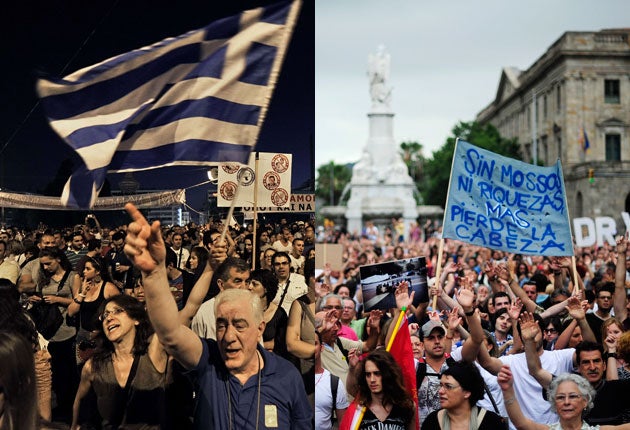Papandreou fights for austerity plan – and survival

Your support helps us to tell the story
From reproductive rights to climate change to Big Tech, The Independent is on the ground when the story is developing. Whether it's investigating the financials of Elon Musk's pro-Trump PAC or producing our latest documentary, 'The A Word', which shines a light on the American women fighting for reproductive rights, we know how important it is to parse out the facts from the messaging.
At such a critical moment in US history, we need reporters on the ground. Your donation allows us to keep sending journalists to speak to both sides of the story.
The Independent is trusted by Americans across the entire political spectrum. And unlike many other quality news outlets, we choose not to lock Americans out of our reporting and analysis with paywalls. We believe quality journalism should be available to everyone, paid for by those who can afford it.
Your support makes all the difference.Tens of thousands of Greeks descended on cental Athens last night to lay peaceful siege to parliament ahead of a confidence vote in the government due to take place tomorrow. Earlier in the day Greek Prime Minister, George Papandreou, confirmed that the country was seeking a second international bailout in order to avoid a potentially disastrous default.
In what is fast becoming a weekly ritual, Athens' Syntagma Square was transformned into a giant village fete with a broad cross-section of the population united only by their hatred of the MPs. "Greeks are always divided but now for the first time everyone is here together," said Achilleas Peklaris, the head of a volunteer group calling itself the "Calm-downers". "All Greece is here and that is something new."
The occupation of Syntagma Square, which enters its 26th day today, has yet to voice a clear set of demands, but it also shows no signs of packing up, with a hard core of 400 campers regularly bolstered in the evening by large crowds. Protesters armed with a distinctly Greek mix of flags, iced coffees and cigarettes chanted adapted football slogans at their MPs debating nearby, calling them "thieves" and demanding an end to austerity measures.
The government faces a confidence vote in parliament tomorrow having failed to pass a new package of austerity measures or win the support of the opposition for a unity government. Talks were also under way in Luxembourg last night where Greece's new Finance Minister was seeking the final instalment of the last year's rescue package from the International Monetary Fund and the European Union.
Unless Evangelos Venizelos persuades the IMF and Germany to waive their reform requirements and sign off on the €12bn instalment, Greece will be unable to meet its debt repayments and would technically default in a matter of weeks. Negotiations among the EU finance ministers were expected to continue late into last night.
Under the terms of last year's agreement, Greece was meant to have made greater progress in public-sector cuts and a privatisation programme and its budget deficit is running far higher than the prescribed 7.5 per cent.
Mr Venizelos was promoted in an emergency reshuffle last week as the price a weakened Mr Papandreou had to pay for ensuring party loyalty in both the confidence vote and in a second attempt to pass austerity measures, which is expected within one month.
The political turmoil in Greece last week panicked financial markets and effectively forced Germany to drop its insistence that the private sector would have to share some of the pain in a second bailout.
Public anger in Greece at spending cuts and tax increases has spilled over into regular riots. The Greek premier tried to draw some of that anger yesterday by offering a referendum later this year on changes to the constitution aimed at making it easier to trim the country's bloated public sector.
Adopting a more populist tone, he also railed against the media, market speculators and tax havens for destroying market confidence in Greece and driving up the cost of borrowing.
"I ask for a vote of confidence because we are at a critical juncture," Mr Papandreou told parliament yesterday the beginning of a three-day session that will end tomorrow with the confidence vote.
"The debt and deficits are national problems that have brought Greece into a state of dependence that may have protected us from bankruptcy, but which we need to get out of," he added.
However, there is little confidence among experts that a new bailout will achieve anything other than delaying an eventual default. This is because the EU-IMF prescription of austerity for loans has so far failed to impact on Greece's debt burden of 160 per cent of GDP and the country's economy is still shrinking.
There is widespread agreement among economists both inside and outside Greece that some restructuring of the national debt will be necessary despite the continued opposition of the European Central Bank.
The pain in Spain
* Tens of thousands of Spaniards abandoned their customary quiet day with families and friends yesterday to march against the so-called "Euro Pact" and the handling of the economic crisis. In Madrid, marches began at six locations around the city before convening in front of the Prado art museum, a stone's throw from parliament. Police estimated that between 35,000 and 45,000 protesters attended, with no reports of violence. The protests have largely concentrated on the Euro Pact, agreed by eurozone politicians to stimulate competitiveness, which in Spain has prompted reforms to give companies greater power to hire and fire. "The politicians have to come here and see this," said Paloma Cirujano, 30, a nurse. "This [movement] has to come to something. It won't just end here."
Join our commenting forum
Join thought-provoking conversations, follow other Independent readers and see their replies
Comments